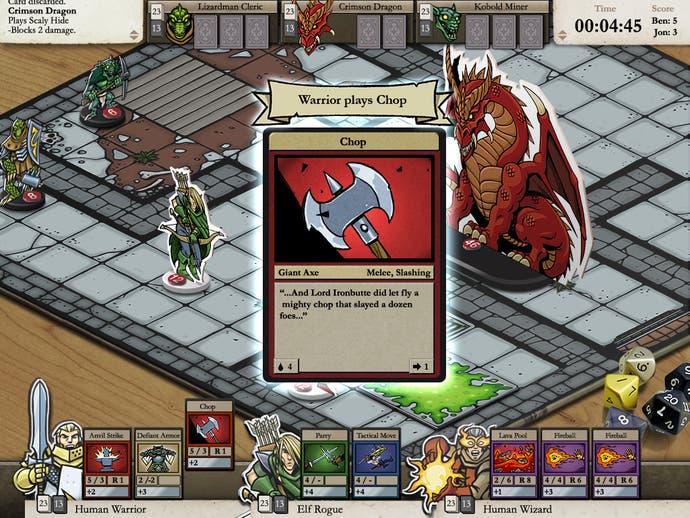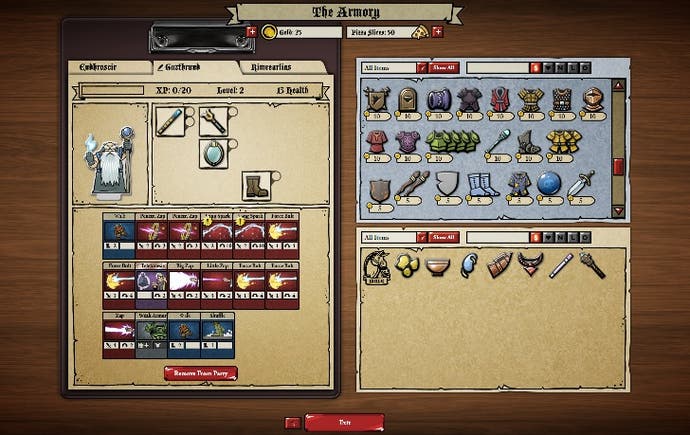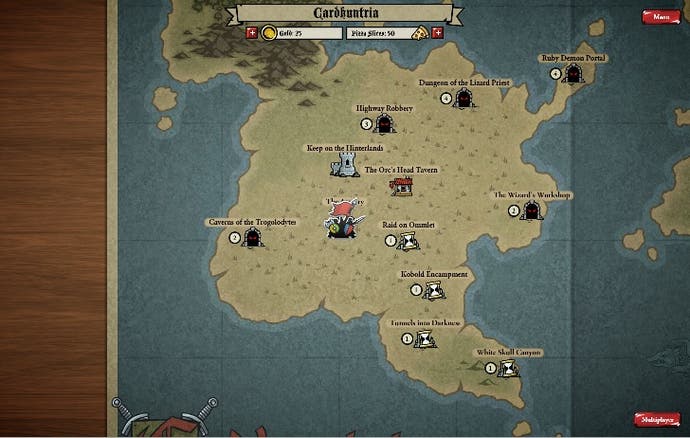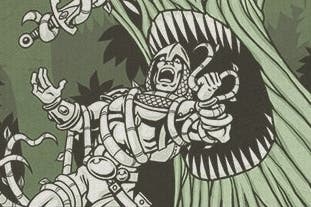Meet Card Hunter, an RPG from veterans of Irrational, PopCap, and Magic: The Gathering
Deck the hordes.
Card Hunter is a wonderfully genial sort of name for a video game - and the video game it belongs to seems suitably inviting, too. Blue Manchu's debut seeks to blend the collectible card game genre with the endless thrills of a good dungeon crawler, and if that doesn't sound cozy enough, it's also wrapping everything up in trappings that invoke the pizza-fuelled late nights of an '80s D&D session. I gather if you roll a double six, Judge Reinhold and Steve Guttenberg will appear and destroy you.
That D&D element is worth dwelling on before we get into the action itself, in fact. Although Card Hunter plays out in a web browser, Blue Manchu's used every trick available to give proceedings a lovely tactile feel. Your cards are dealt and deployed with a sharp, papery snap, while the tokens that represent your band of heroes - and the ghastly horrors they encounter - are made of thick, chunky board, and are pummeled into oblivion accompanied by the colourful crashes and crunches of uncommonly vivid sound effects. The playing area, meanwhile, is another piece of card laid out on what looks like the family dinner table. Paperclips and many-sided dice can occasionally be seen off to the side, while vanquished units gather along the edges the longer you play. Best of all, the quests you go on are represented by cheaply-printed booklets, fronted with limited-colour images and suitably pulpy sizzle text. You can almost smell the mimeograph ink.
It's enough to convince you that you're in safe hands here, and it turns out, of course, that you are. Blue Manchu's a bit of a supergroup affair, as it happens, with team members that include Jon Chey, a co-founder of Irrational Games, Farbs, the genius developer of Flash oddity Captain Forever, and other assorted veterans of places like Looking Glass and Trion Worlds. It's not surprising to discover that Blue Manchu's director Joe McDonagh spent a few years looking after Jimmy Lightning and co. at PopCap, the masters of audiovisual feedback. Card Hunter's still in beta, which means it has a few rough edges, but the Peggle-like attention to the details that really matter is already clearly evident.

As is a veteran designer's skill at drawing even casual players into the pleasant complexities of a game's deeper systems. Card Hunter's probably a rather hardcore project when you get right down to it, but its first few hours pass in a burbling froth of glorious victories and maddening this close defeats. After gathering a party of three heroes, all drawn from a range of classic races and a handful of different classes, you venture off on quests which unfold as a series of battles spread across a selection of different dungeon chambers.
Battling's strictly turn-based as you and your foes take positions, pick between a variety of moves, and then rush from harm's way when things get hairy - and the CCG element lies right at the heart of the fighting. Cards control everything from your the process of running about and your defensive abilities to the range of different attacks you can lay on your foe, and rather than building your deck in isolation, the whole system is snugly folded into your inventory.
Equip a new weapon, in other words, and you'll find that the weapon provides a range of new cards that can be used on the battlefield. The better the sword you've just found, the better the cards it offers. A basic wand or axe might give you a few semi-decent attacks thrown in with a bunch of rather limp offerings, for example, while the next level up is more likely to tilt the balance in your favour.

This means that, if you choose to ignore the small print stuff, you can be building a deck without even really knowing it. You're just dropping into the inventory screen after a skirmish and swapping items around before diving back to the action and seeing all the new treats you have in store. Between the warrior's melee attacks and the wizard's ranged blasts, there are plenty of punchy tricks to keep the battlefield lit up, while a range of cards covering movement - along with armour, shields and healing cards - ensure that there's more to think about than mere damage when equipping your gang.
Best of all, though, is the fact that battles move along at a real clip. Each round sees your team dealt a handful of different cards each, and you then trade them with your foe until you're either out of options or ready for a refresh. When both parties choose to pass a turn, it's time for the next round: everyone discards all but two of their remaining cards, then new cards are dealt - and finally the whole thing repeats itself until somebody's dead.
The system's both easy to get your head around and ripe with tactical possibilities - in a game where placement makes so much difference in a battle, it can be a surprisingly agonising business simply deciding whether to advance on the enemy or let him come to you at the start of a round. It also gives the game a wonderfully ingratiating pace. Card Hunter's designers have clearly spent a lot of time refining the rhythms of their battler, all of which means that its quests and its levelling curve can ease themselves right into your daily life before you've really noticed. Beyond the loop that takes you from one brawl to the next, incidentally, there's a wider narrative at work, too, as you and your dungeon master Gary - nice nod, that one - bicker and fret about real-world concerns while you gather around the kitchen table.

Card Hunter's going to be free-to-play when it finally launches, and even in the beta there are two different currencies at work - in-game gold and pizza slices, which can be bought in bulk using PayPal before being transformed into gold. Having plugged away for the best part of a day, though, it seems like the whole thing's being handled with relative generosity: the game's possibly a little bit grindy as you move between a level two quest and a level three quest, for example, but it's hard to tell how much of that grind is down to you learning how best to equip your characters and get the most out of the compact dungeon layouts they're dropped into. You'll want to buy better gear, but you probably won't have to wait too long to save up for it in-game. My only lingering concern is that a free-to-play game that features dice rolls so heavily is ripe for some manner of behind-the-scenes meddling.
The final ace in Card Hunter's hand is a biggy: Magic: The Gathering's Richard Garfield is consulting on the project, which makes the whole thing quite the singularity of brilliance. His presence seems emblematic of the class that Card Hunter already exudes. This is exciting stuff - and I say that before I've even had a glimpse of the multiplayer.

